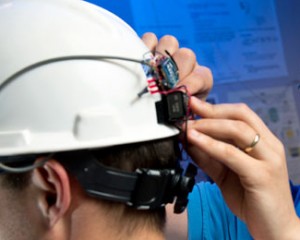Heads-up for new poison monitor
 Wearable safety computers attached to hard-hats may be the next big life-saver in poisonous work environments.
Wearable safety computers attached to hard-hats may be the next big life-saver in poisonous work environments.
A report from the Virginia Tech College has highlighted the dangers of operating gasoline-powered tools in enclosed spaces, where poisonous carbon-monoxide can build up and overwhelm the user.
Researchers have taken the first step in preventing such cases, integrating a ‘pulse oximetry’ into a typical helmet to alert the worker to impending carbon monoxide build-up. They say it can predict poisonous levels with a probability of greater than 99 per cent.
“While this helmet targets carbon monoxide poisoning, we believe there are compelling opportunities for wearable computing in reducing injuries due to falls, electrocution and particulate inhalation as well as workers on foot being struck by vehicles,” the paper said.
“This helmet is only a first step toward our long-term vision of having a network of wearable and environmental sensors and intelligent personal protective gear on construction sites that will improve safety for workers.”
The researchers behind the project - computer engineering PHD student Jason B Forsyth, electrical and computer engineering professor Thomas Martin, civil engineering and environmental engineering assistant professor Deborah Young-Corbett and associate professor of industrial design Ed Dorsa – received the Best Paper Award at the 2013 Institute of Electrical and Electronic Engineers (IEEE) Conference on Automation Science and Engineering.
A copy of the research paper is accessible online.







 Print
Print